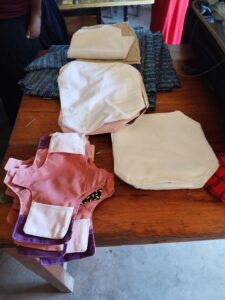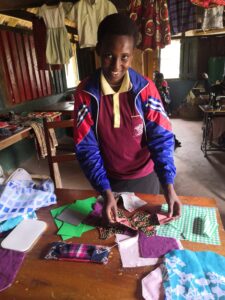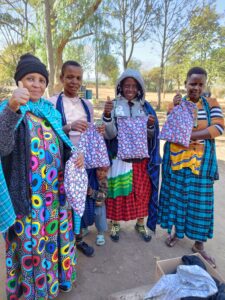
The Meserani Project – Empowering Girls & Women
Part One – Menstruation
Africa is a continent, not a country, and is characterised by a largely uneducated population living in poverty and dependent on foreign aid. Poverty is widespread, and to date Africa continues to remain as the world’s poorest and most underdeveloped continent, with the lowest life expectancy (in 2022 it was 61 years for males and 64 for females). High levels of illiteracy (40% of all adults in Africa are currently illiterate), food insecurity, malnutrition, lack of investment in agriculture, climate change, ongoing regional conflicts, lack of access to health care facilities, high levels of communicable diseases, lack of access to clean water supplies, poor sanitation and poor infrastructure all contribute to the vicious, never-ending cycle of poverty that traps the indigenous populations.
Tanzania is located in East Africa and is currently one of the world’s 25 poorest countries. Forty-four percent of the population live in extreme poverty (2022) surviving on 1.90 USD per day. Fifty-one percent of the population are female (January 2023) and a significant proportion of these are adolescent girls. In traditional Maasai society girls are of little value and are married off when they reach puberty for a dowry. The dowry almost always consists of donations of cows, sheep and goats, and is a costly business for the prospective suiter. Once the girl is married, she becomes the property of her husband, she moves in with his family and has very little contact with her own family.
The Meserani Project is a U.K. registered charity that has supported and provided educational opportunities for the children of the Meserani area in Tanzania since 2004 – an area where there is currently no secondary school, and no opportunities for further education. Pupils have been sponsored from the Meserani area to attend secondary boarding schools, high school, college and university since 2009, in various establishments throughout Tanzania. Pupils were selected by a committee of teachers, local councillors and village elders, and selection was based on academic ability, good attendance at school and most importantly, the family’s inability to finance education. To date 288 students have been sponsored. Forty-eight per cent of the students selected to continue their education beyond primary school were girls – a statistic that The Meserani Project is extremely proud of, as it does not mirror national statistics in Tanzania, with boys being extremely dominant in terms of education beyond primary school. Educated women have smaller, healthier, and better educated families. Girls who attend school are more able to stand up for themselves, resist violence and abuse and marry later, having fewer children. We were aware when we started sponsoring girls to attend school that one in ten girls are absent from school during their menstrual cycle and this equates to 20% of the academic school year. Long term, this can seriously affect their education, as they are constantly having to catch up.
Menstruation is a natural bodily function that affects billions of girls and women worldwide. In developing countries there is a lot of stigma attached to menstruation. Girls and women can be mocked, bullied and made to feel ashamed of themselves. They can become isolated, depressed and consequently they start to neglect themselves. Having little or no control over their lives they are open to abuse and exploitation. Living in hand to mouth poverty, the cost of sanitary pads is prohibitive and this drives girls and women to resort to unhygienic practices -some of which are known to be old rags, cotton, sponges, old mattress filling, leaves and sand. This can cause urinary and genital infections, and long term it can lead to infertility. It is especially problematic where female genital mutilation is practised, something that is commonplace amongst the traditional Maasai population.
When The Meserani Project first started sponsoring students in 2009, the girls were provided with sanitary pads purchased from a local village store. The pads allowed the girls to continue their education, restore their dignity and gave them control over their lives. But like all similar sanitary products that are available worldwide they are not environmentally friendly, they are non-recyclable and non-biodegradable. Disposing of them is harmful to the environment, they pollute water bodies, contribute to land fill and produce smoke if burnt. In Tanzania they are disposed of in pit latrines or are burnt. The average woman uses up to 15,000 pads during her lifetime. Single use sanitary pads consist of up to 90% plastic and this includes packaging.
 In November 2022 the co-founder of The Meserani Project, Diane Swan, attended a course on how to make reusable feminine hygiene pack that consisted of a pouch and pads. The pouch was made from polycotton, and PUL or Ripstop fabric. PUL and Ripstop are soft, lightweight, flexible, waterproof, breathable fabrics. The pads were made from 100% brushed cotton and flannelette sheeting. Each pack consisted of a ‘pump’ bag, two pouches and nine pads. The only issue that concerned Diane was that new materials used to make the feminine hygiene packs were expensive.
In November 2022 the co-founder of The Meserani Project, Diane Swan, attended a course on how to make reusable feminine hygiene pack that consisted of a pouch and pads. The pouch was made from polycotton, and PUL or Ripstop fabric. PUL and Ripstop are soft, lightweight, flexible, waterproof, breathable fabrics. The pads were made from 100% brushed cotton and flannelette sheeting. Each pack consisted of a ‘pump’ bag, two pouches and nine pads. The only issue that concerned Diane was that new materials used to make the feminine hygiene packs were expensive.
Diane had to seek advice on suitable cheaper, alternative materials if she was to make feminine hygiene packs for the girls and women sponsored by the Meserani Project. The advice that was given, was to use polycotton duvet sheets, and nylon waterproof shower curtains for the pouches, and to use 100% cotton t-shirt material and old flannelette sheets for the pads. This would be an excellent recycling project, and good for the planet – fitting in perfectly with Diane’s personal beliefs and philosophy. She put an appeal out for the aforementioned items and was inundated with donations. When she returned to Tanzania in December 2022 she took the materials over with her and taught the ladies at an adult education centre created by another U.K. charity, how to make the feminine hygiene packs. This would allow them to set up their own businesses making the kits, earning an income and giving them independence. Returning to the UK Diane engaged with the ladies from a nearby Women’s Institute and a nearby church who set about making 90 feminine hygiene packs between them. An awesome task. A lady from a nearby Soroptimists made 90 ‘pump’ bags in which to hold the necessary number of packs for one female. The packs were handed out in July 2023 to the girls sponsored by the Meserani Project in Tanzania, to the workers at the campsite in Tanzania where The Meserani Project is based and to the staff working at the aforementioned adult education centre. The packs were obviously gratefully received by all, and the experience was most humbling for Diane This was something so simple, yet it could change their lives. The women all said that it would save them money, as they are often faced with a hard choice – do they use money for food to feed their family or do they buy single use pads for themselves.
task. A lady from a nearby Soroptimists made 90 ‘pump’ bags in which to hold the necessary number of packs for one female. The packs were handed out in July 2023 to the girls sponsored by the Meserani Project in Tanzania, to the workers at the campsite in Tanzania where The Meserani Project is based and to the staff working at the aforementioned adult education centre. The packs were obviously gratefully received by all, and the experience was most humbling for Diane This was something so simple, yet it could change their lives. The women all said that it would save them money, as they are often faced with a hard choice – do they use money for food to feed their family or do they buy single use pads for themselves.
After use, the pads are washed in clean, cold water using soap and are dried in direct sunlight. Pupils from a U.K. secondary school, who were in Tanzania in July 2023 supporting the work of The Meserani Project, provided each girl with two pairs of pants to use with each kit, and helped with the distribution of the kits. Whilst sorting out the pants for the girls, Diane came across three pairs of period pants. Always curious, she asked one of the teachers to explain what exactly what they are, and how are they are used.
 Returning back to the U.K. Diane spent time researching the whole idea behind the use of period pants, and began to realise that this was something that really needed pursuing. What Diane found interesting was that every woman she spoke to about period pants had never heard of them. Diane researched a number of large retail shopping outlets and discovered that the majority of stores you assume would sell period pants, did not do so, and furthermore the shop assistants did not know what they were either. Eventually Diane found two major high street retailers that did actually sell period pants, which can also be ordered online. It was decided that although the feminine hygiene packs were a wonderful idea, sourcing suitable recyclable materials was difficult and time consuming and making them is labour intensive involving highly skilled machinists. Period pants are definitely the way forwards.
Returning back to the U.K. Diane spent time researching the whole idea behind the use of period pants, and began to realise that this was something that really needed pursuing. What Diane found interesting was that every woman she spoke to about period pants had never heard of them. Diane researched a number of large retail shopping outlets and discovered that the majority of stores you assume would sell period pants, did not do so, and furthermore the shop assistants did not know what they were either. Eventually Diane found two major high street retailers that did actually sell period pants, which can also be ordered online. It was decided that although the feminine hygiene packs were a wonderful idea, sourcing suitable recyclable materials was difficult and time consuming and making them is labour intensive involving highly skilled machinists. Period pants are definitely the way forwards.
Period Pants
Period pants are excellent for Planet Earth, having a massively lower environmental impact than single use alternatives. They significantly reduce the amount of waste that is produced each month, which goes on to pollutes the environment. There is a significant long term financial saving for their users, and a reduction in the risk of toxic shock syndrome.
Period pants are available in different styles and thicknesses. They are discreet, and consist of layers of moisture wicking, absorbent, leak proof material. They are washed after use and can last two to three years.
The girls sponsored by the Meserani Project will now be provided with six pairs of period pants and a ‘pump’ bag to keep them in. The cost per girl is £32 – not a huge amount of money. Restoring dignity, giving the girls and women confidence, control over their lives and allowing them to achieve their full potential is a huge step forward for The Meserani Project.















Off